The Town of Castine is renowned for its historical sites and artifacts, many of which date to the Revolutionary War. Yet one curiosity, located on the MMA Waterfront, is largely forgotten and underappreciated: the Andrews Marine Engineering Laboratory, the birthplace of nuclear engineering at the Academy. What remains is a bronze plaque depicting a propeller, an anchor, and the atom icon, which is featured prominently in the top center.
![]() In 1961, President John F. Kennedy was in the White House, but the commercial nuclear industry was launched earlier under the Eisenhower administration as part of the Atoms for Peace program. A major highlight of that era was the world’s first nuclear-powered merchant ship, the NS Savannah. MMA alumni were integral in that technological showcase, as the NS Savannah’s crew included Chief Engineer Herbert C. Phelps ’57, First Engineer Lawrence W. Gribbin ’56, Second Engineer Richard L. Renner ’56, and Second Mate Charles B. Weeks, Jr. ’64. Renner returned to MMA in the 1960s and taught nuclear engineering coursework while Captain Weeks retired as Professor Emeritus of Marine Transportation and Nautical Science.
In 1961, President John F. Kennedy was in the White House, but the commercial nuclear industry was launched earlier under the Eisenhower administration as part of the Atoms for Peace program. A major highlight of that era was the world’s first nuclear-powered merchant ship, the NS Savannah. MMA alumni were integral in that technological showcase, as the NS Savannah’s crew included Chief Engineer Herbert C. Phelps ’57, First Engineer Lawrence W. Gribbin ’56, Second Engineer Richard L. Renner ’56, and Second Mate Charles B. Weeks, Jr. ’64. Renner returned to MMA in the 1960s and taught nuclear engineering coursework while Captain Weeks retired as Professor Emeritus of Marine Transportation and Nautical Science.
Reflecting on the significance of this monument, one is left with a deep sense of appreciation for the contributions and foresight of these alumni, as well as the faculty and administration at that time. Essentially, only twenty years after the founding of the Academy, the Andrews Marine Engineering Laboratory took the lead, ushering in the atomic age in Maine.
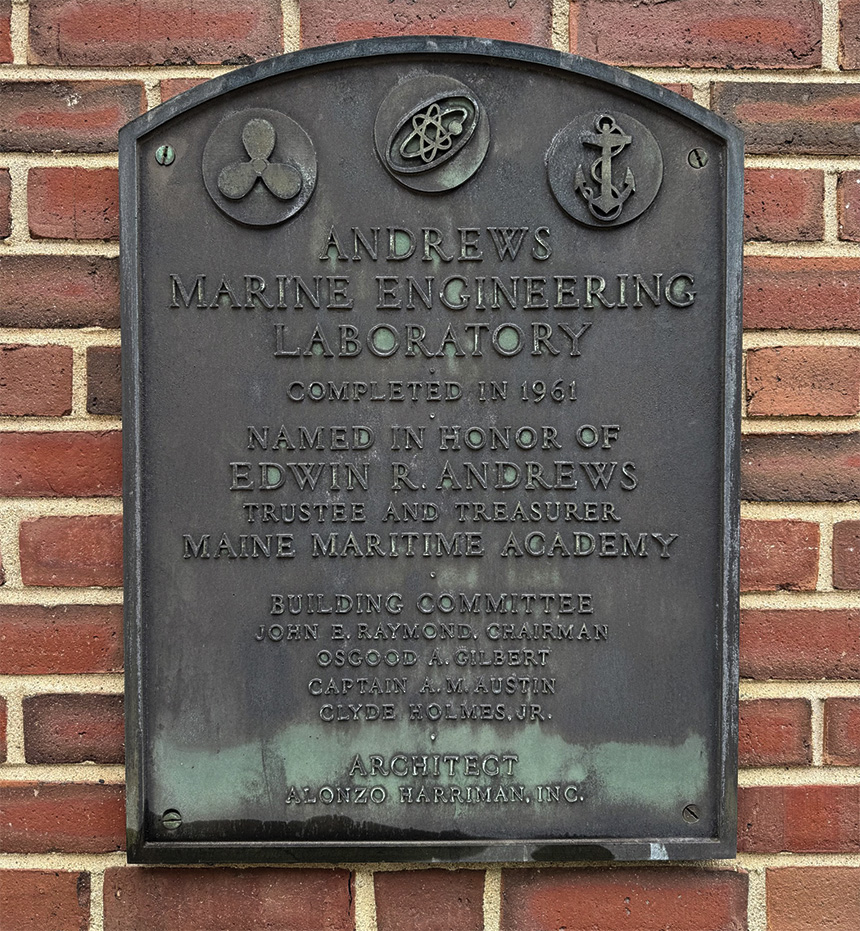
The Andrews Marine Engineering Laboratory was the birthplace of nuclear engineering at MMA, and still bears a bronze plaque depicting a propeller, an anchor, and the atom icon.
Arriving in Castine in 2002 to start an academic career, I was captivated when I first saw the nuclear plaque. In graduate school at the University of Virginia, I conducted materials engineering research at a 2 megawatt (MW) reactor fueled by the Cobalt-60 radioisotope. It was a fascinating experience, but I knew then, in the late 1980s, that the nuclear industry was facing strong headwinds, largely regulatory in nature, coupled with the extensive use of domestic coal, oil, and gas for power generation. While pivoting my academic and industrial interests to electro ceramics for naval applications, I nevertheless hoped that someday the nuclear renaissance would still occur.
Historically, Maine Maritime Academy had been distinct even among maritime academies by offering a highly valued nuclear engineering minor. In fact, through the early 1980s, all marine engineers at the Academy completed two introductory courses in nuclear engineering. The Academy became an early leader within the maritime academic community in providing marine engineering undergraduate students with an understanding of nuclear power technologies. Those specialized skills augmented the traditional hands-on marine engineering and power engineering curricula that gave students plant operations experience and field-level operational understanding of mechanics, naval architecture, reliability, risk analysis, thermodynamics, materials, repair and maintenance. These nuclear-trained graduates were actively recruited by employers in both the maritime and shoreside power industries and particularly sought by the U.S. Nuclear Navy.
The Academy became an early leader within the maritime academic community in providing marine engineering undergraduate students with an understanding of nuclear power technologies.
Throughout the 1960s and into the 1970s, the nuclear program was active and in demand, but in the early 1990s when the nuclear industry reached its economic nadir, the nuclear engineering minor was suspended.
By the early 2000s, when I started teaching at the Academy, engineering faculty members were restarting conversations about reintroducing nuclear as awareness of climate issues and the need for finding sources of clean energy grew. In 2010, Mark A. Coté ’83, now an Emeritus Professor of Engineering, developed a special topics course on the nuclear power industry. Yet it was not until the end of 2022 when my chance encounter outside of Dismukes Hall with then MMA President Jerald S. Paul ’89 evolved into a serious discussion. We outlined current technological trends in the arena of decarbonization and the development of maritime nuclear propulsion applications, coupled with requests by industry stakeholders. It was evident that a renewal was underway, and for us a clarion call to reconstitute the nuclear engineering minor program.
Paul is an alumnus with a minor in nuclear engineering himself and then worked for the U.S. National Nuclear Security Administration (NNSA). He recognized the opportunity for the Academy, and by January 2023, he appointed me the Chair of the MMA Nuclear Working Group to begin designing the course plan. I assembled a team of faculty colleagues, including Professors Marsden S. Davis, Lance A. Burton † ’90 and ’13, Jerald P. Markley ’69, Joseph P. Harman ’86, and Rory T. Hersom ’88. Supplementing that core group was Christopher J. Oelschlegel ’05, Senior Submarine Project Manager at Orbis, Inc., William G. Wabberson, a former colleague of President Paul at NNSA, and Michael W. Cukierski, a retired MMA professor who taught nuclear engineering at MMA in the 1980s. Valuable insights were revealed from the past, and current and relevant industrial practices were applied in our work to develop the first course, Ne-201, Introduction to Nuclear Engineering Operations.
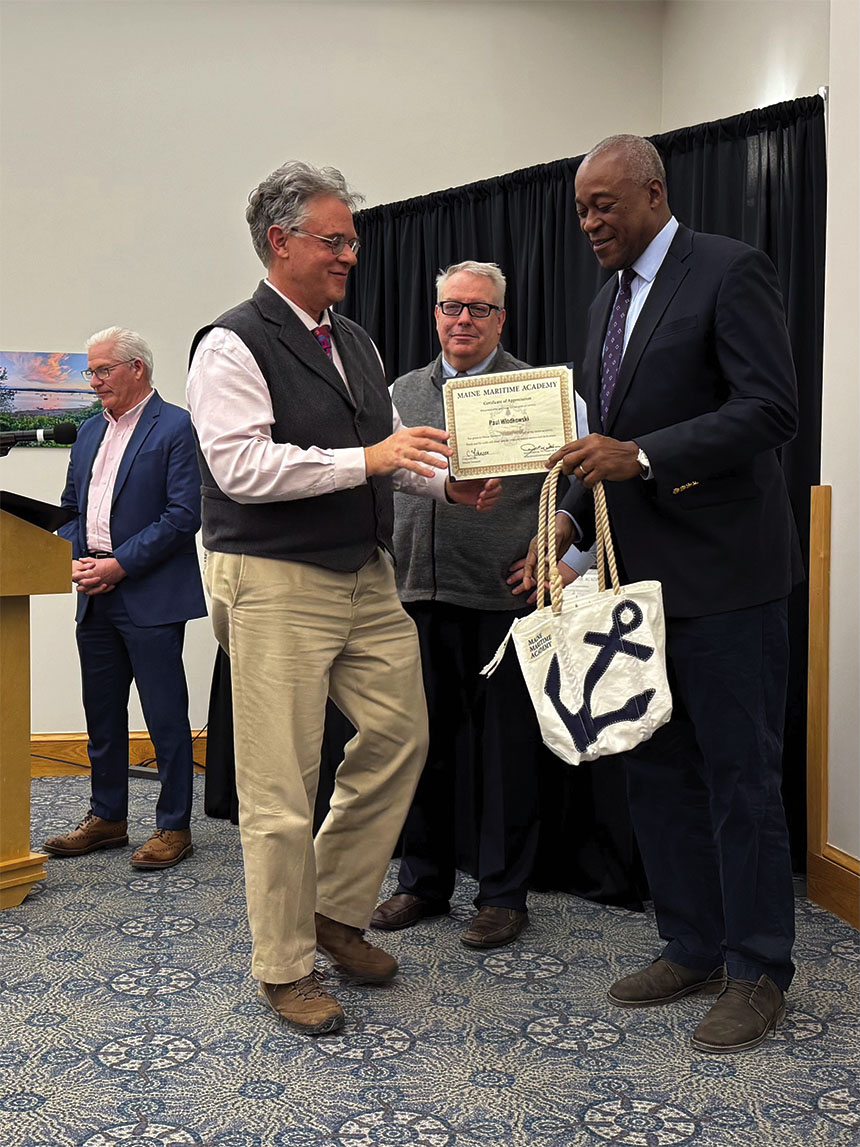
Wlodkowski receives an award in recognition of his over 20 years of service to the Academy in February.
In August of 2023, at the start of the Fall semester, our first class enrolled. Shortly thereafter, other related courses followed: Nuclear Materials & Applications, as well as Risk Assessment and Reliability Engineering. Those, in turn, were supplemented by a revamped steam curriculum and coursework in Sustainable Energy & Society and Environmental Regulations & Compliance. In March 2025, by a vote of the Faculty Senate, Maine Maritime Academy officially reconstituted its Nuclear Engineering minor, after a hiatus of three decades. We are now poised to contribute a major role in the application of small modular reactor (SMR) technology for the commercial maritime industry. That first cohort of students with this credential graduated in May 2025!
The feasibility of going beyond the nuclear minor is a natural and logical extension. A vibrant, stand-alone major — Nuclear Engineering Technology (NET) — will be a tremendous asset for the Academy. Attaining that goal would immediately distinguish MMA from all other U.S. maritime academies. In fact, within the entire International Association of Maritime Universities (IAMU) of eighty-one (81) academic institutions from forty-four (44) countries, only the Admiral Makarov State University of Maritime and Inland Shipping (St. Petersburg, Russia) has a degree-granting nuclear program in their Department of Nuclear Ship Power Plants. Outside the scope of the IAMU, China, South Korea, and Japan all have active programs developing nuclear technology for the merchant marine — propulsion as well as floating power plants.
The need is great. The engineering and industrial workforce base for nuclear propulsion and shoreside power generation continues to be increasingly constrained. Escalation in development of infrastructure and advanced technologies in these fields is paramount to efforts toward decarbonization throughout global maritime networks, military platforms and shoreside zero-emission power plants. It is also important to America’s national security and energy independence.
In this time of critical need to address climate and environmental issues, nuclear energy offers many promising solutions: propulsion, desalination, power generation to isolated regions, and production of hydrogen for fuel cells, etc. With zero carbon emissions, and a power density orders of magnitude greater than any other source (renewable or fossil), nuclear builds upon many existing strengths within the Harold Alfond School of Engineering, notably our steam curriculum. With advances now made in modular microreactors, as well as molten salt reactors, the American Bureau of Shipping (ABS), one of our corporate partners, is critically evaluating nuclear as a viable solution to decarbonization and zero-emissions of the world’s commercial fleet. Here, MMA needs to be the educational and training leader.
In December 2023, the United Nations (UN) Climate Change Conference (COP28) was held in Dubai; it saw 198 signatory countries to the UN Framework Convention on Climate Change call for accelerating the deployment of low-emission energy technologies including nuclear power for deep and rapid decarbonization, particularly in hard-to-abate sectors such as industry. In addition, 25 countries at COP28 pledged to work towards tripling global nuclear power capacity to reach net-zero by 2050.
On November 18, 2024, Rafael Mariano Grossi, Director General of the International Atomic Energy Agency (IAEA) addressed the Opening Plenary of the American Nuclear Society’s (ANS) Winter Conference and Expo in Orlando, Florida. What surprised many at this convention — brimming with excitement at the recent technological developments associated with small modular reactors and microreactors — was his targeted emphasis on the maritime industry. Because a significant 2-3% of global carbon emissions are attributed to this sector, Grossi signaled that in 2025 the IAEA was launching the Atomic Technology Licensed for Applications at Sea (ATLAS), which is an initiative and framework for enabling the safe and secure deployment of peaceful, maritime nuclear energy.
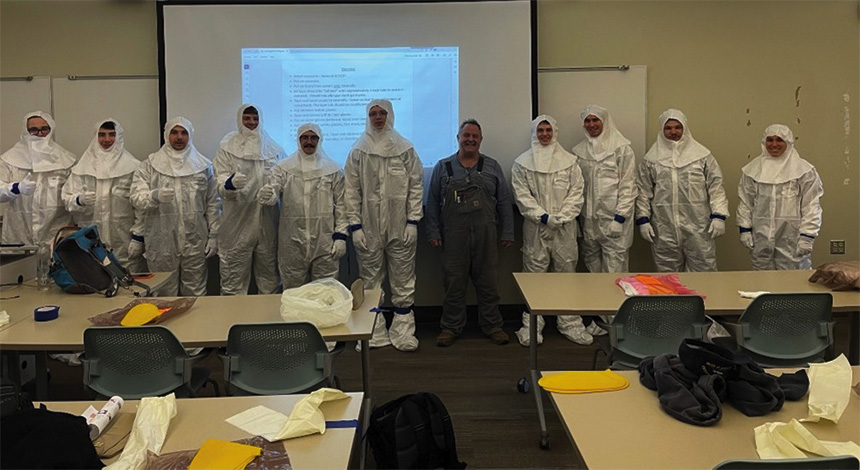
Professor Lance Burton† ’90 and 13’ teaching Radiological Controls.
Later in the conference, I would represent MMA as part of an executive panel discussing commercial maritime decarbonization through nuclear energy. The momentum gained from this recent activity serves as the basis for establishing a Center for Education and Training of the Nuclear Merchant Mariner (NMM).
This initiative is transformational. Pipeline graduates of the MMA’s NET program will help fill the needs of the engineering and workforce shortage, including positions in the nuclear and reliability industries spanning research, development, testing, and evaluation (RDTE) of new technologies. It would constitute an historic innovation to MMA’s curriculum and contemporary industry responsiveness.
In the State of Maine, the premier nuclear facility is the Portsmouth Naval Shipyard (PNS). Historically it is also the oldest shipyard in the United States, having been established in 1800. Today, its mission is the safe overhaul, repair and modernization of the U.S. Navy’s nuclear-powered attack submarine fleet, specifically Los Angeles and Virginia-class submarines. PNS employs a civilian workforce of top-tier professionals that provide a full spectrum of in-house support — from engineering services and production shops, to unique capabilities and facilities, to off-site support — all of which serves the multifaceted assortment of fleet requirements. Among the ranks of its employees are many MMA alumni.
In this time of critical need to address climate and environmental issues, nuclear energy offers many promising solutions.
Today, a combination of (1) advances in reactor technology and (2) strong regulatory-driven decarbonization drivers in the maritime industry are creating renewed interest in nuclear reactors. The variety of emerging small modular reactor and microreactor technologies offer drastically different value propositions and operating envelopes compared to legacy technology. The concept of interchangeable “nuclear batteries” for powering ships and barges and/or floating power on mobile marine assets is a game changer for the industry. Equally important, the maritime industry is striving to achieve the highly aggressive decarbonization goal of a 50% carbon reduction by the end of 2030 (and a more aggressive goal of an 70% reduction by 2050). This initiative is pushing the industry to go far beyond energy efficient use of lower carbon fuels/scrubbers to dramatically different options like hydrogen, ammonia, and nuclear-powered operations. There has never been a better time for nuclear technology to gain traction with the commercial maritime industry.
According to Christopher J. Wiernicki, Chairman and CEO of ABS, “The opportunity is even more important than good economics for maritime companies — it affects national and economic security for the U.S. The ability to introduce and control U.S.-based nuclear technology options for the maritime industry can expand multiple elements of the U.S. economy. The distinct advantages of advanced reactor technology for maritime applications can (1) revitalize U.S. shipping companies and shipbuilders that have suffered without a competitive differentiator from foreign competitors, (2) create a potential market of thousands of ships and offshore assets for U.S. nuclear reactor designers, builders, and operators, and (3) develop a supply and logistics support chain for fueling these reactors in the U.S. This technology would be transformative for the U.S. economy and job growth.”
MMA’s foray into the nuclear sphere is timely because numerous early-stage development projects are underway across the industry, covering mobile floating power assets as well as the development of various types of vessel propulsion concepts. Small modular reactors will be operating onshore before the end of 2030, and deployment of maritime applications will soon follow. Now is the time to build the pipeline of jointly qualified maritime and nuclear workers needed to have the highly skilled workforce that will be required.█
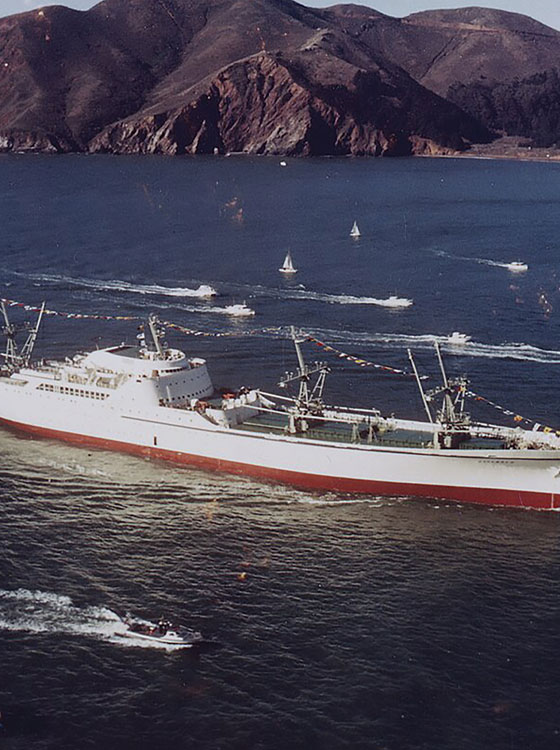
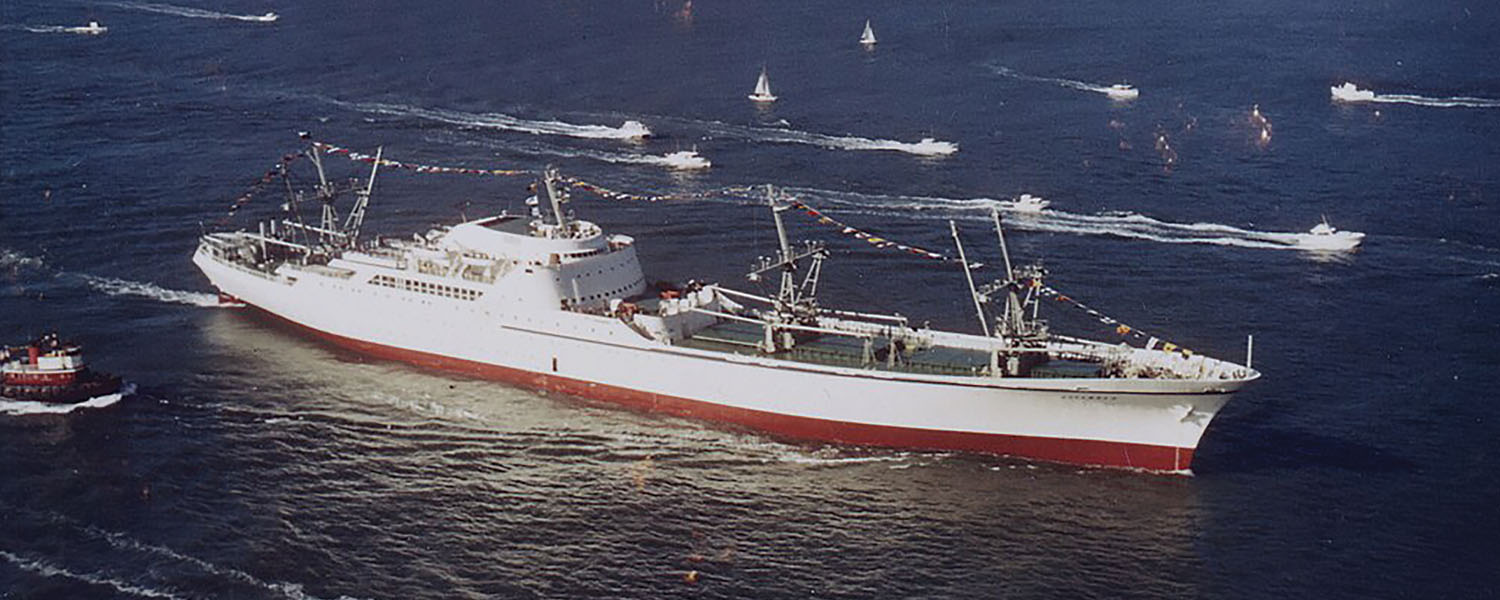



Post Comment
Comments are moderated and will be reviewed prior to posting online. Please be aware that when you submit a comment, you agree to the following rules:
Maine Maritime Academy reserves the right to delete any comment that does not comply with these guidelines and is not responsible or liable in any way for comments posted by its users. If you have a message for the editor, please email mariner@mma.edu.
Features
View All >Read More
Read More
Castine, Maine 04420All Rights Reserved © 2026
Privacy Policy & Terms
Web issue? Contact Webmaster